The purpose of NATO is to keep the US in, the Russians out, and the Germans down.
The ongoing and escalating tension regarding NATO’s expansion has the potential to ignite a destructive conflict which even if it avoids escalation into nuclear catastrophe would nevertheless cause untold suffering on the continent.
In recent weeks, the situation regarding the pressure on Russia, primarily by the incessant expansion of NATO military forces into Ukraine has threatened to come to a head. The particulars of what, if any, events would trigger a military conflict cannot be predicted, though provocative actions by Ukrainian Nazi elements against the breakaway republics in the east that forces some sort of Russian intervention seems most likely at this juncture.
The bigger picture, beyond any ‘Franz Ferdinand’ moment, is that Russia has concluded that the ever-increasing presence of NATO military forces in Eastern Europe — and now specifically Ukraine — constitutes a de facto accession by Kiev to the US led military alliance.
Given the realities of geography, this poses an existential threat to Russia and, due to NATO’s expansion since 1991 up to and including the former Soviet Baltic republics, it appears that they do not trust the blandishments from Washington that there is no cause for concern.
Given, too, the record of the United States in the last thirty years, there is reason to be skeptical of US sweet talk. In that period it has assaulted Yugoslavia, unflinchingly backed Israeli intransigence; broke new records for sheer dishonesty which paved the way to invading and destroying Iraq; continually misrepresented the vast majority of the Syrian rebels as anything other than extreme Islamic jihadis; engaged in nonstop regular and often successful attempts at funding (to the tune of billions of dollars) and organising colour revolutions against governments that attempt to preserve some degree of sovereignty, to wit Venezuela, Belarus, Ukraine, Hong Kong, and Nicaragua.
In the 1990s it also managed to savagely loot Russia of vast amounts of wealth. The renewed hostility to Russia since the advent of Vladimir Putin’s presidency can be traced to the reconstitution of Russia as an actual — as opposed to notionally — sovereign state. This massively reduced the extraction of wealth by western capitalists, much to their chagrin ever since.
Of course, the renewed Russia was and remains a far cry from the USSR of old. Geographically and demographically it is much reduced. It retains, albeit in a much more tamed fashion, some of the oligarchic economic structure that mushroomed in the 1990s. It lacks, therefore, the ideological orientation of the USSR and pushes a much more modest agenda internationally, as well as domestically.
Be that as it may, the mere fact that Russia is insisting on maintaining its de facto independence from the US Empire, itself the spearhead of a global capitalism that relegates all collective identities of class and nation to the scrap heap of history, constitutes an ideological opposition, limited though it is in comparison to the USSR.
Socialism requires state action to push forward. States which surrender their sovereignty to the American imperium or even just exist in a relationship of dependency to multinational corporations are not and cannot be vehicles for socialism.
As such the existence of states such as Cuba, Venezuela, Syria, and Russia, despite their significant differences, and in some cases regrettable abandonment of socialism, remain essential bearers of the possibility of constructing a future that is not suffocated by the US led capitalist order.
This perspective does not entail any illusions about Russia or its government. They have made clear that they do not wish to resurrect the USSR and in fact they have consistently impeded the Communist Party of the Russian Federation, which continues to have a mass following within Russia itself. The question at hand, however, is not the domestic politics of Russia but the necessity to avoid a bloody conflict in such a way that does not involve Russia’s submission to the US Empire. In this regard the Communist Party of the Russian Federation are no less patriotic and it takes little effort to recall that it was the Red Army that defended not only the October Revolution but also the very existence of the Russian and other nations within the Soviet Union.
The specifics of the present crisis regarding Ukraine, NATO, and Russia’s concerns regarding its security emanate from the aggressive action of the United States. It is true that neither power is a socialist state but this does not mean that both are equally culpable. The sustained long-term aggression of the United States and the presence of its troops and weaponry thousands of miles from its borders are concrete evidence that it is at root the party primarily responsible for the confrontation.
Russia may no longer be socialist and its present defensive orientation internationally may be a result of weakness of position rather than any definitive commitment to abstract moral ideals, but nevertheless it is the USA that has been rampaging around the world for decades now; it is the USA that is expanding its military reach to the border of Russia and not vice versa; it is the US that funds and arms Neo-Nazi and Jihadi militias. One does not have to view the Russians as innocent choir boys to be able to discern the reality of US imperialism and how it renders the foreign policy of Russia as mild and sensible by way of comparison.
Apart from using actual Nazi gangs and their liberal NGO pets to stage a putsch in 2014, the US has made it clear that it will not permit Ukraine to exist in a sort of Austrian neutrality vis-á-vis the Russian Federation. The US is no longer first amongst equals, such as it carried itself in post-1945 Europe. It is an Empire and expects its dictates to be followed. The major European states, Germany and France in particular, may grumble but their views do not count for much in Washington.
The dominant faction of the ruling class of both countries are satisfied with US domination. Even the independent conservative nationalist orientation of a de Gaulle is by now quite foreign to the vast majority of western politicians. Integration in and submission to the US is the order of the day and the occasional pathetic bleatings of the European Union serve only to confirm its willingness to sacrifice its own self-interests on the altar of US hegemony.
In time, the dire cost may awaken the notoriously short-sighted German bourgeoisie to their precarious position, but for now, suspending gas supplies from St Petersburg while goose-stepping to Kiev is the order of the day.
US aggressiveness is not, of course, a deviation from the logic of the capitalist system, but rather, in our particular era, a manifestation of it.
The longer-term concern is to prevent the accession of China such that it can displace the western, specifically US, ruling class as the masters of the world. This requires bringing Russia into the fold which, as the recently resigned German Admiral admitted, could be done by granting Russia a measure of respect.
Indeed, once again, the Russian Federation is not the USSR, and has no inherent ideological reservations about partnering with the USA and NATO. Its error is that it wishes to do so on the basis of equality whereas the United States expects submission. For a long time the Russians have attempted to forge a relationship with the United States, but now, with the advent of the complete incorporation of Ukraine into the US military sphere it calculates that it will not be able to remain sovereign into the medium term if its security is so directly weakened.
For its part, the USA benefits on a number of fronts from pressuring Russia, apart from the usual side benefits of profits for arms manufactures and the like. Firstly, it keeps the European states wrongfooted. Despite the anti-Russian hysteria of the last 15 years and rising tide of anti-China sentiments, the pre-eminent foreign policy objective of the US is to prevent the emergence of a unified, independent European state. Such a state would have the demographic and technical resources to immediately challenge the US. The primary function of NATO is to ensure this does not happen but nevertheless a sense of crisis is periodically needed to ensure the European bourgeoisie do not forget their subservient status.
Secondly, while the US could quite possibly gain geo-strategically from treating Russia with respect, the Russians may not be so keen to kick sand in China’s eyes, just to benefit a United States of America that is safely tucked away behind two oceans. On the other hand, a completely neutered — like Ukraine — Russia would be a compliant creature and given the geographical realities would gravely weaken China’s strategic position. Therefore, the core goal of the constant pressure on Russia is not to contain it but to eventually effect regime change in Moscow itself.
Thirdly, there remains a lot of plunder to be had in Russia. The Russians had the cheek to put a stop to the plunder of the 1990s and therefore need to be taught a lesson that their role is to service not only the Pentagon but its vampire sibling in Wall Street. Given the rather ropey health of present day capitalism a round of primitive accumulation at the Russians’ expense would serve to kick the can down the road a little longer.
The present crisis has echoes of the pre-1914 era; a long period of peace is undermined by constant manifestations of crises, each one rendering the possibility of war a bit more likely. The Anglo-American hegemonic powers are wary of rising industrial rivals; Germany then, China now and tempted to strike before they can attain the full measure of their strength.
However, many fundamental differences have emerged since 1914, not least the possibility of a terminal nuclear conflict which serves to reduce — but not eliminate — the possibility of escalation to a generalised world war. The other major departure is the accomplished industrialisation of Russia and China and the concomitant settling of the peasant question through a process of urbanisation and proletarianisation. Both historic states were extremely vulnerable to revolution in the 1914 period because their state form — remnants of a pre-capitalist mode of production — had been brought into contradiction with realities of industrial capitalism and the social relations it engendered. This is not the case today.
That vulnerability was less in the more advanced capitalist states of central and western Europe but there certainly was a threat to bourgeois domination due to the sheer scale of the labour movement and its effective merger with socialism. Irrespective of how it played out, this socialist-labour movement was perceived as a threat to the social order and all the great powers had to factor it in when manoeuvring against their rivals, lest they be overthrown by socialists in the aftermath of a failed geo-political conflict, as indeed they were in Germany, Austria, and Russia.
This is also not the case today. The socialist-labour movement has been supplanted by a nebulous and effectively pro-imperialist left, which by its nature, i.e. the basic absence of really mass organisations with an objective interest in an alternative economic system, does not constitute an alternative social-order in waiting. As such the western ruling class do not fear their own overthrow if they receive a bloody nose in Ukraine. On the other hand, there is no appetite amongst any European country to fight a war in eastern Ukraine in order to further US hegemony and it is doubtful that they would, in any case, be able to muster any force capable of fighting Russia. It will be up to the Ukrainians to die for western capitalism.
The reassertion of state power vis-á-vis capital, even by a non-working class government would be in itself an improvement in the objective conditions for socialists. The specific step required is for the United States to suffer a major setback such that it can no longer operate as the gendarme for the western bourgeoisie. While the USA seems to be working towards internal collapse, a significant military setback would serve to accelerate the reduction of their domination abroad and create space for the reassertion of state power more broadly.
NATO has made noises about Ukraine’s right to join it, should it so decide. But the decision has to be mutual: NATO could simply decline to consider Ukraine for membership and the present situation would be eased considerably. Of course, they know that but they want to maintain a state of tension with Russia in order to keep the European nations subservient, increase the possibility of selling LNG, and, ultimately to effect regime change in Moscow.
Despite our weakness, socialists must continue to agitate for peace, even when the logic of capitalism is pointing to the creation of large scale conflict. In Ireland, of course, this entails the banning of the US military from utilising Shannon and other travel facilities and the ceasing of any intelligence sharing.
While the immediate problem stems from Washington and its delusions of eternal hegemony, the deeper causes lie within the internal dynamic of the capitalist system itself. As profitability is squeezed and with a rising economic power house in the Far East the conditions of geo-political competition have re-emerged. As long as the impetus for attaining ever increasing profits remains, international competition will likewise remain. This can only be overcome by a planned economic system that serves humanity as a whole, which itself depends on working class control of states with real power as opposed to states which exist at the sufferance of financial capital. It is in this narrow assertion of state sovereignty that Russia, despite its fall from the USSR, can yet serve as an agent of social progress.











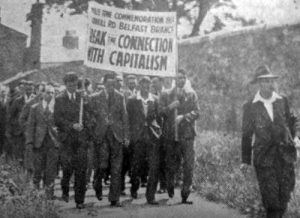 Ireland was highly socially conservative, had a relatively small working class, the socialist movement was young and the workers’ movement had yet to achieve the kind of mass successes it had won in mainland Europe and in the UK. It would be fair to say that the terrain of struggle was difficult.
Ireland was highly socially conservative, had a relatively small working class, the socialist movement was young and the workers’ movement had yet to achieve the kind of mass successes it had won in mainland Europe and in the UK. It would be fair to say that the terrain of struggle was difficult.
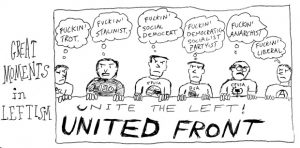



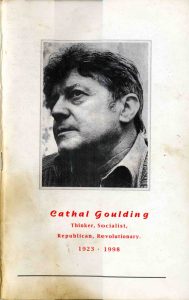 This introduction and interview is from “On Our Knees: Ireland 1972” by Rosita Sweetman
This introduction and interview is from “On Our Knees: Ireland 1972” by Rosita Sweetman In 2012, there was substantial outrage about Russia placing restriction on foreign financing of NGOs and unions which was spurred by the fact that there was significant funding by the United States. The Western media were almost uniformly appalled that such restrictions would be placed. I remember reflecting at the time on what the media angle might be were the roles reversed. What if Russia had tried to interfere in US politics by funding opposition forces? I surmised there would be immediate calls of treason and the response would be at least as intense as the one for which Russia was being condemned.
In 2012, there was substantial outrage about Russia placing restriction on foreign financing of NGOs and unions which was spurred by the fact that there was significant funding by the United States. The Western media were almost uniformly appalled that such restrictions would be placed. I remember reflecting at the time on what the media angle might be were the roles reversed. What if Russia had tried to interfere in US politics by funding opposition forces? I surmised there would be immediate calls of treason and the response would be at least as intense as the one for which Russia was being condemned. 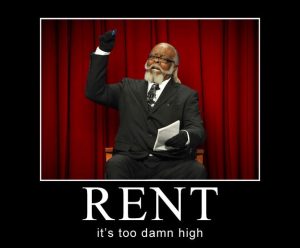 After a quick perusal of Daft.ie, it’s clear that the rental situation in Dublin is an absolute catastrophe. Rental prices have gone through the roof. Literally, garden sheds and one-car garages are now going for 900 Euro per month and more. Prices are up more than 30% from their lowest point, and they are now higher than they have ever been, even during the Celtic Tiger. To add insult to injury, you would be hard pressed to find a place to rent even if you could afford one, perhaps by packing in like sardines. The recent saville report says that vacancies are now below 1.5%.
After a quick perusal of Daft.ie, it’s clear that the rental situation in Dublin is an absolute catastrophe. Rental prices have gone through the roof. Literally, garden sheds and one-car garages are now going for 900 Euro per month and more. Prices are up more than 30% from their lowest point, and they are now higher than they have ever been, even during the Celtic Tiger. To add insult to injury, you would be hard pressed to find a place to rent even if you could afford one, perhaps by packing in like sardines. The recent saville report says that vacancies are now below 1.5%.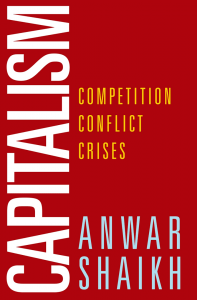 For a long time, neo-classical economics has been the economic orthodoxy. Neo-classical economics is a patchwork of theories all with a general aim of demonstrating how production and distribution takes place under mediation of supply and demand.
For a long time, neo-classical economics has been the economic orthodoxy. Neo-classical economics is a patchwork of theories all with a general aim of demonstrating how production and distribution takes place under mediation of supply and demand.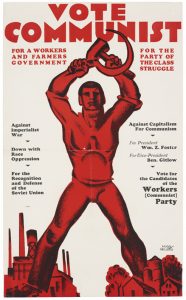 This article is a response to an article posted on The North Star by Sophia Burns, a comrade and fellow member of the Communist Labor Party titled Don’t Run for Office. It can be found here:
This article is a response to an article posted on The North Star by Sophia Burns, a comrade and fellow member of the Communist Labor Party titled Don’t Run for Office. It can be found here: